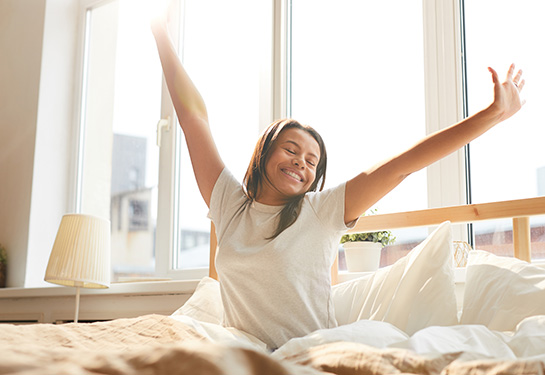Try these 13 tips to help you sleep better
Blue light, sunlight, naps and exercise can all affect your shut-eye
The gold-standard treatment for sleep problems is cognitive behavioral therapy for insomnia or CBT-I. “Healthy sleep habits, or ‘sleep hygiene,’ is a significant component of CBT-I and is freely available,” said psychiatrist Jesse Koskey.
Koskey is an associate clinical professor in the UC Davis Department of Psychiatry and Behavioral Sciences. He found that behavioral changes are the best approach and can be as simple as listening to music.
Below are 13 tips based on CBT-I that Koskey shares with his patients. He recommends not tackling them all at once. Instead, target one or two each week and add more the following week. “It's better to do just one of these new behaviors every night than all of them every now and then,” Koskey said.
- Sleep only when sleepy. This reduces the time you are awake in bed.
- If you can't fall asleep within 20 minutes, get up and do something boring until you feel sleepy. Don't expose yourself to bright light while you are up. The light gives cues to stay awake. Instead, you might sit in a chair and read.
- Don't take naps. This will ensure you are tired at bedtime. If you just can't make it through the day without a nap, sleep less than one hour, before 3 p.m.
- Get up and go to bed at the same time every day, even on weekends! When your sleep cycle has a regular rhythm, you will feel better.
- Refrain from exercise at least 4 hours before bedtime. Regular exercise is recommended to help you sleep well, but the timing of the workout is important. Exercising in the morning or early afternoon will not interfere with sleep.
- Develop sleep rituals. It is important to give your body cues that it is time to slow down and sleep. Listen to relaxing music, read something soothing for 15 minutes, have a cup of caffeine-free tea, or try relaxation exercises, like deep breathing.
- Only use your bed for sleeping. Refrain from using your bed to watch TV, pay bills, do work or read. That way, when you go to bed, your body knows it is the place where it sleeps. Sex is the only exception.
- Stay away from caffeine, nicotine and alcohol at least four to six hours before bed. Caffeine and nicotine are stimulants that interfere with your ability to fall asleep. Coffee, tea, cola, cocoa, chocolate and some prescription and non-prescription drugs contain caffeine. Cigarettes, vapes, and some drugs contain nicotine. Alcohol may seem to help you sleep in the beginning as it slows brain activity, but you will end up having fragmented sleep.
- Don’t go to bed hungry — or too full. Have a light snack before bed if you're hungry. If your stomach is too empty, that can interfere with sleep. However, if you eat a heavy meal before bedtime, that can interfere as well.
- Take a hot bath or shower before bedtime. This will raise your body temperature, and the subsequent drop in body temperature may leave you feeling sleepy.
- Make sure your bed and bedroom are quiet and comfortable. A cooler room (about 68 degrees), along with enough blankets to stay warm, is recommended. If light in the early morning bothers you, try blackout shades or curtains, or wear a slumber mask. If noise bothers you, wear earplugs, use white noise from a machine or a YouTube track, or try music. Music has been shown to help with subjective sleep in many studies.
- Use sunlight to set your biological clock. As soon as you get up in the morning, go outside and turn your face to the sun for 15 minutes.
- Avoid blue light from devices. Use a blue-light filter on electronics, or blue light blocking glasses, and avoid any screens without these filters for two hours before bedtime.
Resources






